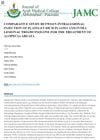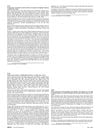TLDR Platelet-rich plasma (PRP) injections successfully treated a woman's steroid-resistant hair loss, causing hair to regrow within a month.
Eight years ago, a case study was conducted on a 41-year-old woman with corticosteroid-resistant ophiasis-type alopecia areata (AA), a form of hair loss that affects the occipital and parietal scalp. The patient had not responded to previous treatments, including minoxidil, topical steroids, and intralesional triamcinolone acetonide injections. The study found that treatment with platelet-rich plasma (PRP) injections led to hair regrowth within one month, with robust regrowth of hairs measuring 2.8 cm by the third month. The patient experienced no mood alterations after the PRP treatment, unlike the mood changes she had experienced after steroid injections. The study concluded that PRP could be a potentially effective treatment for steroid-resistant forms of AA, especially for patients who develop limiting side effects from steroid injections. However, the exact mechanism of PRP in treating AA remained unknown and required further study.
71 citations
,
December 2013 in “The journal of investigative dermatology. Symposium proceedings/The Journal of investigative dermatology symposium proceedings” There are no FDA-approved treatments for Alopecia Areata, and current options have varying success and relapse rates.
110 citations
,
December 2013 in “The journal of investigative dermatology. Symposium proceedings/The Journal of investigative dermatology symposium proceedings” Alopecia areata is a genetic and immune-related hair loss condition that is often associated with other autoimmune diseases and does not typically cause permanent damage to hair follicles.
 205 citations
,
April 2013 in “British Journal of Dermatology”
205 citations
,
April 2013 in “British Journal of Dermatology” Platelet-rich plasma treatment significantly increased hair regrowth and decreased discomfort in alopecia patients, making it a potentially better and safer treatment option.
 270 citations
,
March 2012 in “Dermatologic Surgery”
270 citations
,
March 2012 in “Dermatologic Surgery” Platelet-rich plasma can potentially promote hair growth by stimulating cell growth and increasing certain proteins.
 166 citations
,
August 2011 in “Dermatologic Surgery”
166 citations
,
August 2011 in “Dermatologic Surgery” Platelet-rich plasma with a new carrier significantly increases hair thickness without serious side effects.
 September 2022 in “Journal of Ayub Medical College Abbottabad”
September 2022 in “Journal of Ayub Medical College Abbottabad” Steroid injections are more effective than platelet rich plasma for treating patchy hair loss.
 1 citations
,
January 2022 in “The Egyptian Journal of Hospital Medicine ”
1 citations
,
January 2022 in “The Egyptian Journal of Hospital Medicine ” Cryotherapy and steroid injections are similarly effective and safe for treating alopecia areata.
 3 citations
,
August 2020 in “PubMed”
3 citations
,
August 2020 in “PubMed” Platelet-rich plasma (PRP) is effective in treating various skin conditions and improving hair density, thickness, and patient satisfaction, with lower relapse rates for Alopecia Areata.
1 citations
,
December 2017 in “Dermatology - Open Journal” Alopecia areata was successfully treated with contact immunotherapy, oral antihistamines, and topical corticosteroids.
 4 citations
,
April 2016 in “Journal of The American Academy of Dermatology”
4 citations
,
April 2016 in “Journal of The American Academy of Dermatology” Microneedling with platelet-rich plasma can improve different types of hair loss.
30 citations
,
August 1998 in “International Journal of Dermatology” Systemic corticosteroids don't prevent severe alopecia areata from spreading or relapsing.








